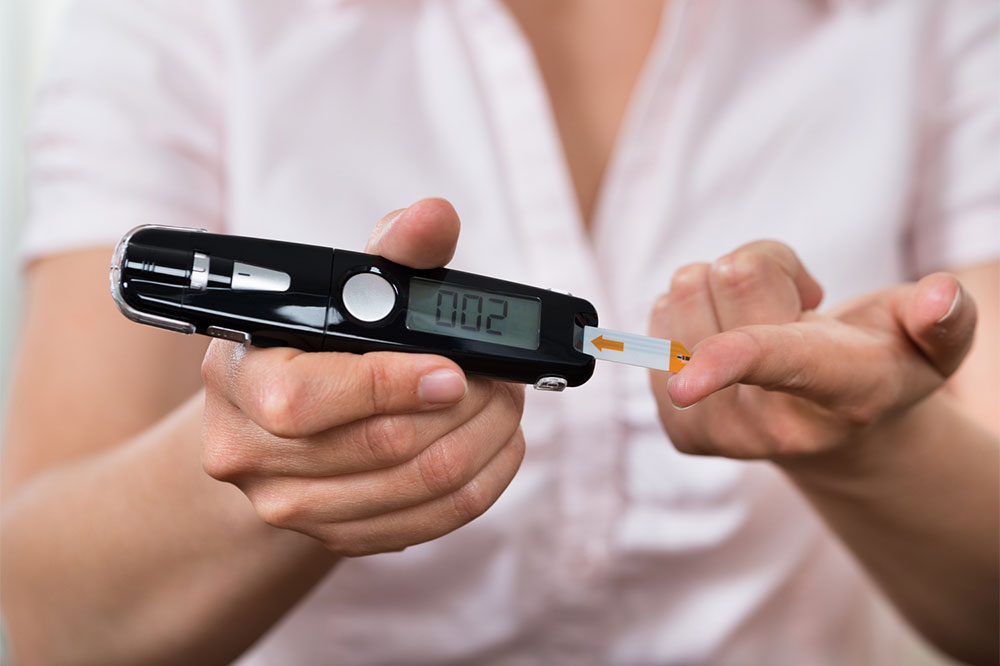
High Blood Sugar – Signs, Causes, and Management Tips
Maintaining appropriate blood sugar levels can keep health complications like cardiovascular diseases, kidney diseases, and the risk of diabetes at bay. According to WHO, there are more than 400 million cases of diabetes worldwide. And it is important to be aware of certain aspects associated with high blood sugar. The following article lists signs and causes of diabetes and suggests nutrition tips, home remedies, and treatments that can help manage the condition.
Signs
- Patches on the skin
A common sign of high blood sugar is acanthosis nigricans, which causes dark and patchy in skin folds of the armpits, neck, and even groin. However, this patchy skin is soft to touch and does not itch. - Blurry vision
Individuals with high blood sugar start having trouble with their vision. High levels of blood sugar can make it difficult for the lens to contract and relax, leading to blurry vision. - Feeling thirsty frequently
Excessive thirst is a sign of high blood sugar. Generally called as polydipsia, it can also lead to dry mouth. - Frequent urination
Polyuria or frequent urination can also be experienced by people with diabetes. This is because the increased levels of sugar in the body lead to an increase in the production of urine in the kidney to flush out excess sugar from the system.
Causes
- Dehydration
Dehydration is caused due to low water level in the body. It can lead to light-headedness, dizziness, and weakness, eventually resulting in high blood sugar. - Improper sleep
Lack of sleep can fluctuate blood sugar levels as it can hamper glucose control and induce insulin sensitivity. Lack of sleep also results in chronic stress, leading to high blood sugar. - Excess caffeine
Caffeine from tea and coffee and other caffeinated beverages can cause restlessness and result in the rise of blood sugar.
Foods to eat
- Oats
Oats are one of the most preferable foods that can help lower blood sugar level. This is because oats have low glycemic value. - Cinnamon
You may be familiar cinnamon rolls or breakfast cereals. The spice is not only rich in minerals and antioxidants that boost immunity but also helps lower blood sugar levels. - Fenugreek
Fenugreek contains healthy fiber and chemicals that can inhibit digestion process of carbohydrates and sugar. This can help improve body’s ability to produce the amount of insulin, and thus, effectively managing blood sugar.
Foods to avoid
- Foods high in starch
High-starch foods must be restricted or completely avoided based on the severity of high blood sugar levels. Some of the high-starch foods to be avoided include white bread, pasta, bagels, and bakery products. - Certain types of meat
Red meat, cold cuts, and processed meats must be avoided if one has high blood sugar. Other protein sources including bacon and hot dogs should also be restricted to keep blood sugar levels in check. - Packaged food products
Packaged food is usually full of additives and low in nutrients. It is suggested to stay away from packaged foods as they can increase blood sugar levels.
Lifestyle changes
- Limit carb intake
Carbohydrates are broken down by the body in the form of sugars, and then the insulin in the body moves these sugars into cells, resulting in high blood sugar. However, it can be fixed by lowering carb intake. - Portion control
Monitoring serving sizes can help reduce the calorie intake and lower blood sugar levels. This can be done by measuring portions, using smaller plates, checking serving sizes on food labels before consuming them, and maintaining a food journal. - Control stress levels
Stress is known to a huge impact on the blood sugar levels. Regular exercise, meditation, and yoga can help reduce stress levels and subsequently maintain blood sugar levels.
Treatment
- Prefilled insulin pens
Prefilled insulin pens are available on prescription and can simply be injected to control blood sugar levels. The dosage of insulin is decided by the doctor based on the severity of high blood sugar. - Insulin pumps
Insulin pumps include an insulin cartridge, a battery-operated pump, and a computer chip that allows one to control the exact amount of insulin that is delivered.




